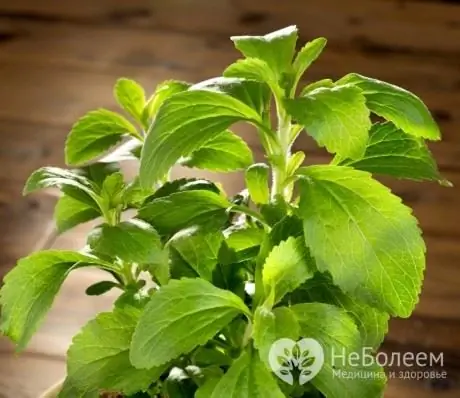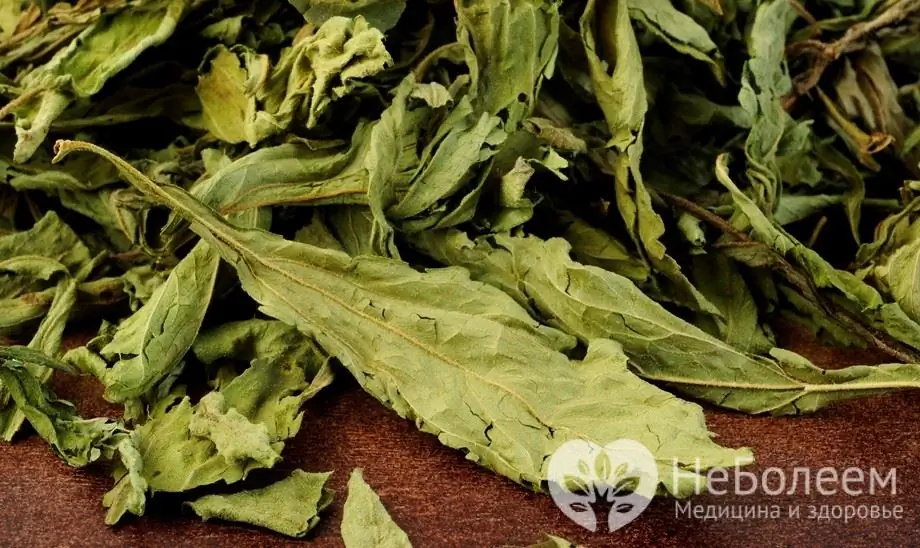- Author Rachel Wainwright wainwright@abchealthonline.com.
- Public 2023-12-15 07:39.
- Last modified 2025-11-02 20:14.
Stevia
Stevia is a perennial plant of the Asteraceae family and Asteraceae species. Stevia is widespread and actively used in South and Central America, has several main medicinal types.
The ratio of BJU in the product

Source: depositphotos.com How to burn 18 kcal?
| Walking | 5 minutes. |
| Jogging | 2 minutes. |
| Swimming | 2 minutes. |
| A bike | 3 min. |
| Aerobics | 4 minutes |
| Household chores | 6 minutes |
Biological features and distribution
Wild stevia is native to the arid plains and mountainous regions of Central America and Asia. After cultivation, the plant began to multiply by a vegetative method. It was first brought to Russia from Latin America in the middle of the 20th century by Academician Vavilov.
Stevia was first grown in South America and was a popular plant in the Maya.
In the 18th century, the Spanish conquistadors, seeing that the aborigines drink stevia tea for various diseases, also began to use this plant for medicinal purposes. By the 19th century, this plant has spread throughout Latin America and Europe.
In the 20th century, the medicinal properties of stevia were proven. The plant restores metabolism, slows down the aging process and protects the body from the negative effects of the environment.
At the end of the 70s of the 20th century, a special program "Stevia" was developed in the USSR, according to which this plant should be used as a product for a healthy diet for the military, astronauts, submariners, scientists and members of government services.
It has been determined that stevia is an effective sweetener and is useful in diabetes, obesity, and disorders of carbohydrate and lipid metabolism.
According to the results of the World Symposium, it was confirmed that stevia is a medicinal plant that has many beneficial properties.
Benefits of stevia
The high benefits of stevia have been proven by various international studies. This herb is medicinal and can be used as a natural sweetener.
The benefits of stevia are high in terms of normalizing blood pressure, lowering blood sugar and cholesterol levels, improving the functioning of the digestive system and cleansing the body.
Stevia tincture can be used as a mouthwash for inflammation and as a natural toothpaste that improves the health of teeth and gums.
Drinks based on this plant improve the functioning of the digestive tract, promote the digestion of food and improve intestinal functions.
Thanks to the antibacterial properties of the plant, the prevention of skin diseases and disorders of the functioning of the cardiovascular system is carried out.
Stevia helps disinfect wounds and is anti-inflammatory.
Stevia use
Stevia is widely used in Japan, where it is actively used in the food industry and medicine. Stevioside is obtained from stevia, which is used for pickling vegetables, drying seafood, making soy sauce and miso.
In the Japanese dietary menu, this plant is used for preparing first courses, stews and salads.
Stevia is actively used in the preparation of desserts and sweet dishes, as well as cereals, yoghurts, ice cream and candy.
In China and Malaysia, stevia is used as a dietary supplement and also as an ingredient in honey tea, which improves digestion and aids weight loss.
In Latin America, this plant is used as an effective remedy for the treatment of diabetes mellitus, it is added to tea and other products, and is also used as a sweetener.
Stevia is a non-toxic plant and has no mutagenic activity. Clinical studies have found that the leaf extract of this plant reduces testosterone levels, improves sexual function in men and contributes to normal brain function.
With hypertension, the extract of the leaves of this plant enhances the excretion of bile and improves urination. Stevia has stimulating, tonic and tonic effects.

Stevia harm
Contraindications to the use of stevia are individual intolerance and predisposition to allergic reactions to the plant. The leaves of the plant have a hypotensive effect, so stevia is contraindicated for people with low blood pressure.
Stevia in large quantities is harmful to people with diabetes mellitus and fat metabolism disorders. When using the plant, it is necessary to constantly monitor the blood sugar content.
May harm stevia (due to the content of essential oils, tannins, etc.) for people with disorders of carbohydrate metabolism and severe diseases of the respiratory system.
Stevia is contraindicated in severe diseases of the digestive system, serious circulatory disorders, hormonal disruptions, mental disorders and in the postoperative period.
YouTube video related to the article:
Found a mistake in the text? Select it and press Ctrl + Enter.






